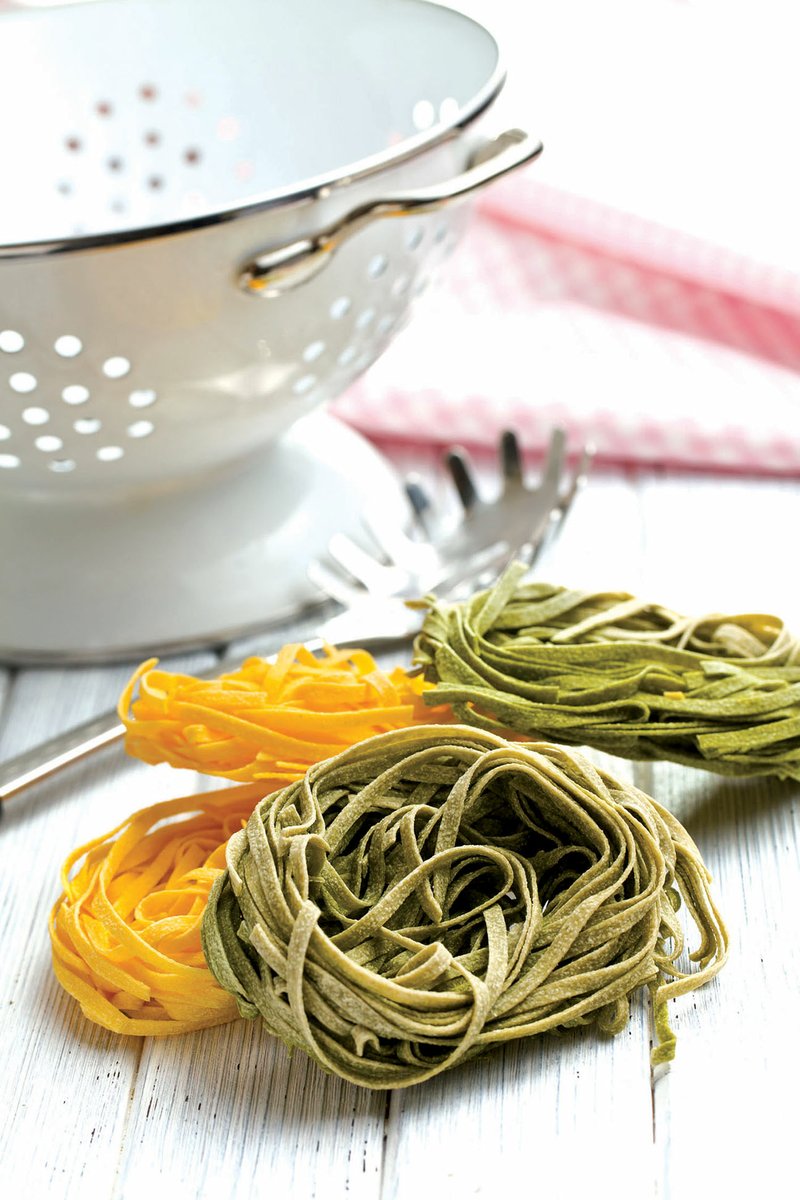Taking a shortcut in the kitchen for the sake of convenience or to save money can sometimes lead to less-than-successful results. I won’t use canned or bottled tomato sauce, for example, if ripe, in-season tomatoes are available to make a quick, sun-sweetened sauce from scratch. And I don’t see the point of containers of pre-grated Parmesan; after all, it takes just a few seconds longer to grate it fresh yourself from a block of the rich, nutty-tasting cheese.
But some shortcuts actually do make sense — if you know what you’re doing. To prove that point, I’d like to share a slightly altered version of one of my favorite, classic springtime pastas; one the Italians call paglia e fieno, literally “straw and hay.”
The name is an imaginative reference to the two kinds of fresh fettuccine that traditionally go into it: straw-colored egg pasta and hay-colored spinach pasta. Quickly boiled until al dente, tender but still slightly chewy, the fettuccine is tossed with a simple sauce featuring fresh peas, slivers of the cured raw ham called prosciutto, and grated Parmesan.
Sounds delicious, doesn’t it? And the dish is easy to make, too.
There are, however, some challenges in its most traditional form. Once upon a time, you’d have had to make the pasta from scratch, a task that isn’t difficult but takes some time. Nowadays, however, you can find packages of ready-to-cook fresh fettuccine, both the yellow-egg and green-spinach varieties, in most supermarkets.
As for the fresh peas, if they’re in season — as they are during spring — and you can find them in your market, shelling them can seem like a bit of a chore and adds to the time an otherwise quick recipe would take. Fortunately, however, there’s the miracle of frozen petite peas, which you can find anywhere, and they are among the few vegetables that seem to me just about as delicious as fresh ones.
As for the prosciutto, that can be a double challenge: Not only might you have to search for it, but it can also be costly. Fortunately, I find that the recipe can taste just as delicious made with far less expensive, much-easier-to-find bacon. Another challenge met!
With these few logical shortcuts, a recipe that might take a couple of hours or longer to make in its traditional form, while ringing up an impressive market tab, winds up being a bargain dish that is ready to serve in less than half an hour, including the time it takes to bring the pasta cooking water to a boil. And all that’s left for you to do before enjoying the fettuccine is to pick up that chunk of Parmesan cheese and grate it over every serving.
STRAW AND HAY PASTA WITH BACON AND PEAS
Serves 4
Ingredients:
2 tablespoons extra-virgin olive oil
1 large yellow onion, minced
8 slices smoked bacon, cut crosswise into narrow strips
1 cup frozen organic green petite peas
1 cup organic chicken broth, plus more as needed
4 tablespoons (1/2 stick) unsalted butter, cut into cubes
Kosher salt
Freshly ground black pepper
6 ounces packaged fresh egg fettuccine
6 ounces packaged fresh spinach fettuccine
Pinch crushed red-pepper flakes (optional)
1/2 cup freshly grated Parmesan cheese, plus more for serving
Directions:
Put a large pot of salted water over high heat.
While the water comes to a boil, prepare the sauce. In a large saute pan over medium heat, heat the olive oil. Add the onion and saute, stirring frequently, until translucent but not browned, 2 to 3 minutes. Add the bacon, and saute until it just begins to brown, about 2 minutes longer.
Raise the heat, stir in the peas and broth, and bring to a boil; then reduce the heat and simmer for about 3 minutes. Add the butter, and stir just until it melts. Remove the pan from the heat, season to taste with salt and pepper, and keep warm.
Add the egg fettuccine and spinach fettuccine to the pot of boiling water, and cook until al dente, tender but still slightly chewy, following the manufacturer’s suggested cooking time. Drain the pasta.
Add the pasta to the sauce along with, if you like, a pinch of red-pepper flakes. Toss the pasta well, and season to taste with salt and pepper. Add the 1/2 cup grated Parmesan, and toss again, adding a little more broth, if needed, to help coat the pasta with the sauce.
To serve the pasta, use a long two-pronged carving fork or tongs to twirl up the pasta and transfer it to serving plates, mounding it in the center. Spoon more peas, bacon and sauce over the pasta. Sprinkle with more Parmesan. Serve immediately.
